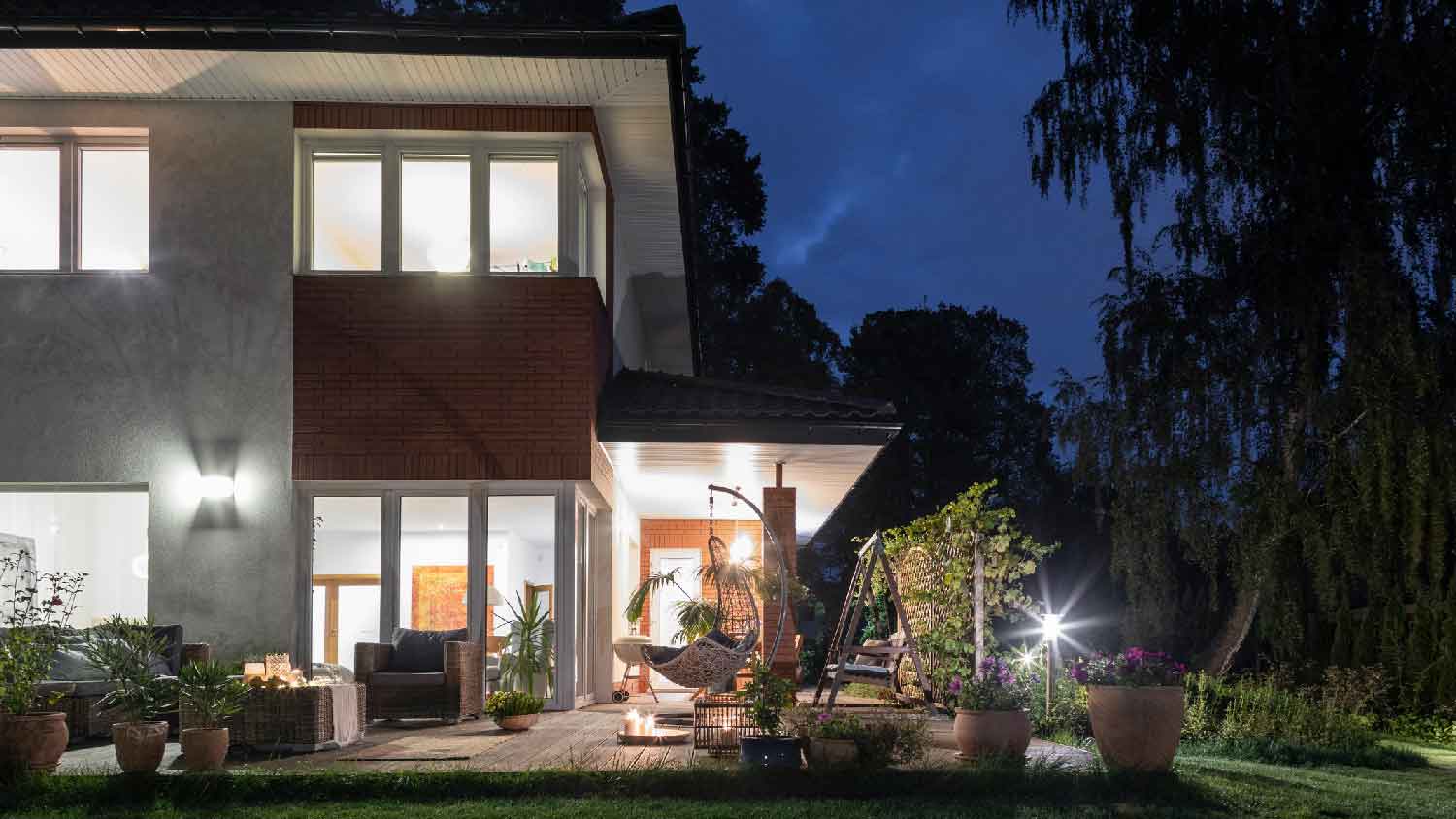
Get matched with top outdoor lighting pros in Mullens, WV
Enter your zip and get matched with up to 5 pros
Need a pro for your outdoor lighting project in Mullens, WV?
TRUSTED BY MULLENS, WV HOMEOWNERS
4.7
Average homeowner rating22
Verified outdoor lighting services reviews
Find Outdoor lighting pros in Mullens

Murray's Window Cleaning
Murray's Window Cleaning
Chase is committed to excellence in every aspect of our business. We uphold a standard of integrity bound by fairness, honesty, and personal responsibility. Our distinction is the quality of service we bring to our customers. Accurate knowledge of our trade combined with ability is what makes us true professionals. Above all, we are watchful of our customers' interests, and make their concerns the basis of our business.
"Done a real good job and I was well pleased and very well mannered and nice to deal with"
Barbara R on September 2025
Chase is committed to excellence in every aspect of our business. We uphold a standard of integrity bound by fairness, honesty, and personal responsibility. Our distinction is the quality of service we bring to our customers. Accurate knowledge of our trade combined with ability is what makes us true professionals. Above all, we are watchful of our customers' interests, and make their concerns the basis of our business.
"Done a real good job and I was well pleased and very well mannered and nice to deal with"
Barbara R on September 2025

High Country Land Service LLC
High Country Land Service LLC
We are a family-owned and operated company based in Hinton, West Virginia serving contractors and private landowners. Licensed & Insured! We take great pride in our experience, expertise, quality, and customer service that we provide to meet the consumers needs. It is our mission to provide excellent workmanship and complete customer satisfaction from start to completion of a project.
"The project was forestry mulching and tree removal to establish a hay field and upgrade a mountainous gravel access road both on steep and difficult terrain. Brian was on time and his work was meticulous. He treated our land like it was his own. We have already begun planning the next project. "
Brett V on September 2025
We are a family-owned and operated company based in Hinton, West Virginia serving contractors and private landowners. Licensed & Insured! We take great pride in our experience, expertise, quality, and customer service that we provide to meet the consumers needs. It is our mission to provide excellent workmanship and complete customer satisfaction from start to completion of a project.
"The project was forestry mulching and tree removal to establish a hay field and upgrade a mountainous gravel access road both on steep and difficult terrain. Brian was on time and his work was meticulous. He treated our land like it was his own. We have already begun planning the next project. "
Brett V on September 2025
DAVE HINKLE ELECTRIC, INC.
DAVE HINKLE ELECTRIC, INC.
We are a locally owned and operated company with roots in the community. We have been providing quality electrical service and upgrades since 1974. Jim is a licensed Master electrician with years of experience. Contact us today for estimates and options for your project!
"Very thorough and professional. Reasonable prices. Very satisfied highly recommend."
john w on May 2025
We are a locally owned and operated company with roots in the community. We have been providing quality electrical service and upgrades since 1974. Jim is a licensed Master electrician with years of experience. Contact us today for estimates and options for your project!
"Very thorough and professional. Reasonable prices. Very satisfied highly recommend."
john w on May 2025
B and J Electrical Services
B and J Electrical Services
B AND J ELECTRICAL SERVICES, is committed to excellence in every aspect of our business. We uphold a standard of integrity bound by fairness, honesty and responsibility in all of our jobs. We are a locally owned and operated business with more than 10 years of experience serving Wharton and surrounding areas. There is no job too big, or too small for our team. Call today and let us put our experience to work for you!
"null"
Robert P on February 2020
B AND J ELECTRICAL SERVICES, is committed to excellence in every aspect of our business. We uphold a standard of integrity bound by fairness, honesty and responsibility in all of our jobs. We are a locally owned and operated business with more than 10 years of experience serving Wharton and surrounding areas. There is no job too big, or too small for our team. Call today and let us put our experience to work for you!
"null"
Robert P on February 2020

Blankenship Lawn Care LLC
Blankenship Lawn Care LLC
Blankenship Lawn Care LLC is committed to excellence in every aspect of our business. We uphold a standard of integrity bound by fairness, honesty, and personal responsibility. Our distinction is the quality of service we bring to our customers. Accurate knowledge of our trade combined with ability is what makes us true professionals. Above all, we are watchful of our customers' interests and make their concerns the basis of our business.
"I actually would rate them a 10 stars, my lawn looks great! Blankenship lawn care are very meticulous! I am very pleased with their courteous, professional, and meticulous lawn care. I highly recommend them for your lawn care. My lawn has never looked better!"
Lorraine L on May 2024
Blankenship Lawn Care LLC is committed to excellence in every aspect of our business. We uphold a standard of integrity bound by fairness, honesty, and personal responsibility. Our distinction is the quality of service we bring to our customers. Accurate knowledge of our trade combined with ability is what makes us true professionals. Above all, we are watchful of our customers' interests and make their concerns the basis of our business.
"I actually would rate them a 10 stars, my lawn looks great! Blankenship lawn care are very meticulous! I am very pleased with their courteous, professional, and meticulous lawn care. I highly recommend them for your lawn care. My lawn has never looked better!"
Lorraine L on May 2024

L A J COMPANY
L A J COMPANY
We pride our company on reliability, great communication, integrity, and quality work. We are experts in our trade and will do our best to keep you as educated as we can on your particular task or project. We look forward to earning your business! Book with us online or feel free to give us a call today!
We pride our company on reliability, great communication, integrity, and quality work. We are experts in our trade and will do our best to keep you as educated as we can on your particular task or project. We look forward to earning your business! Book with us online or feel free to give us a call today!

Alexander Technical Resources
Alexander Technical Resources
Free Phone Consultation. Not sure if we can help? Give us a call, it's on us! We are more than happy to talk with you and discuss your computer problems. Fast service. In some cases we can help you right now! If not, we will schedule an appointment that fits your schedule. If you receive our answering service, please leave us a message. We will call you back as soon as possible. Domestic Based Support. Our company is based right here in the United States and all of our technicians speak clear, fluent English. Safe Interaction. By using our online support center, no one has to come out to your home to fix your computer. That means no strangers in your home and you don’t even have to get dressed, if you don’t want to. Extremely Affordable & Convenient. Unhooking your computer, dragging it out to the car, then driving to the store and dragging in there and waiting for weeks to get it back and then pay hundreds of dollars for such fantastic service. That’s the typical experience for most users. Most Issues are software based. In our experience. 85% of user’s problems are either software or operating system problems due to bugs, worms, virus’, Trojans, malware, grayware or spyware related. As long as your computer turns on and has an internet connection, we can probably solve your issue. If we find that your issue is a hardware issue, we will recommend a trusted, local support company to help you further, if possible.
"Online repair. He has helped me in the past and I cannot say enough nice things about him. The next day I had a tiny issue and he responded immediately. Thorough. Thank you!"
Jan C on February 2019
Free Phone Consultation. Not sure if we can help? Give us a call, it's on us! We are more than happy to talk with you and discuss your computer problems. Fast service. In some cases we can help you right now! If not, we will schedule an appointment that fits your schedule. If you receive our answering service, please leave us a message. We will call you back as soon as possible. Domestic Based Support. Our company is based right here in the United States and all of our technicians speak clear, fluent English. Safe Interaction. By using our online support center, no one has to come out to your home to fix your computer. That means no strangers in your home and you don’t even have to get dressed, if you don’t want to. Extremely Affordable & Convenient. Unhooking your computer, dragging it out to the car, then driving to the store and dragging in there and waiting for weeks to get it back and then pay hundreds of dollars for such fantastic service. That’s the typical experience for most users. Most Issues are software based. In our experience. 85% of user’s problems are either software or operating system problems due to bugs, worms, virus’, Trojans, malware, grayware or spyware related. As long as your computer turns on and has an internet connection, we can probably solve your issue. If we find that your issue is a hardware issue, we will recommend a trusted, local support company to help you further, if possible.
"Online repair. He has helped me in the past and I cannot say enough nice things about him. The next day I had a tiny issue and he responded immediately. Thorough. Thank you!"
Jan C on February 2019
Uxari powered by Vitex
Uxari powered by Vitex
With Uxari, you and your home are connected, automatically. You choose what to connect (devices) and we do the connecting (wireless services plan). Plus, we do it for as little as $99 down with monthly payments as low as $34.99. At Uxari, you will talk to a real person when you have a question, 7 days a week. So go ahead, start enjoying your new life style, knowing answers to all your questions are only a call or an e-mail away. And the best part is all of our services come with a 30-day, risk-free trial. We believe in not only finding exactly the right plan for you, but making sure you’re completely satisfied with it, too.
"The Smart Home features they installed, such as thermostat and door locks, etc. do not always work. For example, the Honeywell thermostat can no longer be operated from our phones and is difficult to install. Remote door locks are also unpredictable."
William B on November 2019
With Uxari, you and your home are connected, automatically. You choose what to connect (devices) and we do the connecting (wireless services plan). Plus, we do it for as little as $99 down with monthly payments as low as $34.99. At Uxari, you will talk to a real person when you have a question, 7 days a week. So go ahead, start enjoying your new life style, knowing answers to all your questions are only a call or an e-mail away. And the best part is all of our services come with a 30-day, risk-free trial. We believe in not only finding exactly the right plan for you, but making sure you’re completely satisfied with it, too.
"The Smart Home features they installed, such as thermostat and door locks, etc. do not always work. For example, the Honeywell thermostat can no longer be operated from our phones and is difficult to install. Remote door locks are also unpredictable."
William B on November 2019

Lance Aaron/ Professional Online Portrait Artist
Lance Aaron/ Professional Online Portrait Artist
Hey, I'm Lance! I became a professional online portrait artist in 2006 after my family was taken from me in a tornado losing my mother, father, brother, and son. Twenty-eight lives were taken as well as all their possessions, like mine. I drew from destroyed photos their families so they could have memorial portraits of them at the funerals and for the rest of time. Since then I have made a living traveling the country doing shows and drawing from photos you email me on line. There is NO GIFT more unique that brings more tears of joy to a loved one's eyes like one of these. Nothing. I've seen it time and time again. I make it affordable to anyone who's ever wanted one of these. Paintings with half the detail of these can cost upwards of $30,000 limiting something like this from hanging in living rooms for families to the rich only. Not anymore. Here's how it works.. Simply email me your favorite picture or pictures to [email protected] with a brief description of what you would like done. The bigger and clearer the picture the better the drawing. I will start an initial sketch right away and take pictures of it and show it to you. Please email them quickly if possible, because the holidays are coming and I get busy. Once the initial sketch is done. I usually take something down on it. It's a lot of work doing the initial sketch. This varies on the cost of the drawing which we will discuss right away. Drawings are usually 175 for 9x12's 225 for 11x14's 275 for 14x17's After this process is done I continue with your art piece sending you photos on line all the way through which many people find a lot of fun. I am also friends on Facebook with almost every person I've ever drawn for as well and would like to be your friend as well if you would like that. I post them on FB at your discretion. It makes me way more legit to people as well. The Prices vary with the art because of the size of the drawing as well as the number of faces. The number of faces DOES NOT double the cost. Usually an extra face is added depending on the size from anywhere between 25 and 50, but I do deals on these more than anything, so please call me about it at .(850) 691-3976
Hey, I'm Lance! I became a professional online portrait artist in 2006 after my family was taken from me in a tornado losing my mother, father, brother, and son. Twenty-eight lives were taken as well as all their possessions, like mine. I drew from destroyed photos their families so they could have memorial portraits of them at the funerals and for the rest of time. Since then I have made a living traveling the country doing shows and drawing from photos you email me on line. There is NO GIFT more unique that brings more tears of joy to a loved one's eyes like one of these. Nothing. I've seen it time and time again. I make it affordable to anyone who's ever wanted one of these. Paintings with half the detail of these can cost upwards of $30,000 limiting something like this from hanging in living rooms for families to the rich only. Not anymore. Here's how it works.. Simply email me your favorite picture or pictures to [email protected] with a brief description of what you would like done. The bigger and clearer the picture the better the drawing. I will start an initial sketch right away and take pictures of it and show it to you. Please email them quickly if possible, because the holidays are coming and I get busy. Once the initial sketch is done. I usually take something down on it. It's a lot of work doing the initial sketch. This varies on the cost of the drawing which we will discuss right away. Drawings are usually 175 for 9x12's 225 for 11x14's 275 for 14x17's After this process is done I continue with your art piece sending you photos on line all the way through which many people find a lot of fun. I am also friends on Facebook with almost every person I've ever drawn for as well and would like to be your friend as well if you would like that. I post them on FB at your discretion. It makes me way more legit to people as well. The Prices vary with the art because of the size of the drawing as well as the number of faces. The number of faces DOES NOT double the cost. Usually an extra face is added depending on the size from anywhere between 25 and 50, but I do deals on these more than anything, so please call me about it at .(850) 691-3976

HelloTech: Tech Support To Your Door
HelloTech: Tech Support To Your Door
Have no fear, HelloTech is here. We can send a tech to your door to help with your computer, home theater, TV mounting, and general device needs. In many cases, we can solve your issues remotely for much less, simply by connecting to your computer.
"They have excellent service"
Heidi G on January 2022
Have no fear, HelloTech is here. We can send a tech to your door to help with your computer, home theater, TV mounting, and general device needs. In many cases, we can solve your issues remotely for much less, simply by connecting to your computer.
"They have excellent service"
Heidi G on January 2022
The Mullens, WV homeowners’ guide to outdoor lighting services
From average costs to expert advice, get all the answers you need to get your job done.

Installing an outdoor outlet is a relatively affordable way to take your outdoor space to the next level. Find out the cost to install outdoor outlets
 •
•Discover the cost to install landscape lighting. Learn about average prices, key cost factors, and ways to save on your outdoor lighting project.
 •
•Get a clear estimate for attic fan repair costs to learn what impacts pricing, how to save, and whether to repair or replace your attic fan.

Is it acceptable to have an electrical panel in a bathroom? Keep reading to find out the best location for this essential feature.
 •
•Get transparent landscape lighting repair cost info. Learn what impacts price, compare repair vs. replacement, and find ways to save on your project.

Learn how to install a C-wire as part of your smart thermostat installation and discover other options that may work for your HVAC wiring.
- 🌱 "Mow a small front yard"
- 🛠 "Fix a leaking pipe under the sink"
- 🏠 "Repair shingles on an asphalt roof"